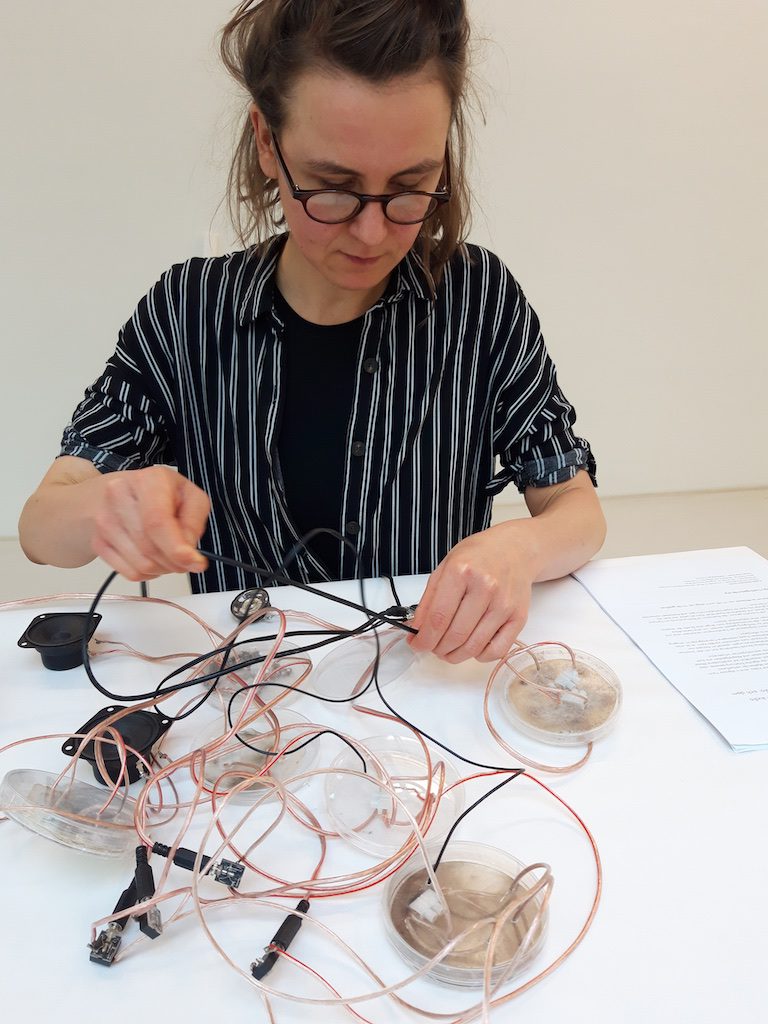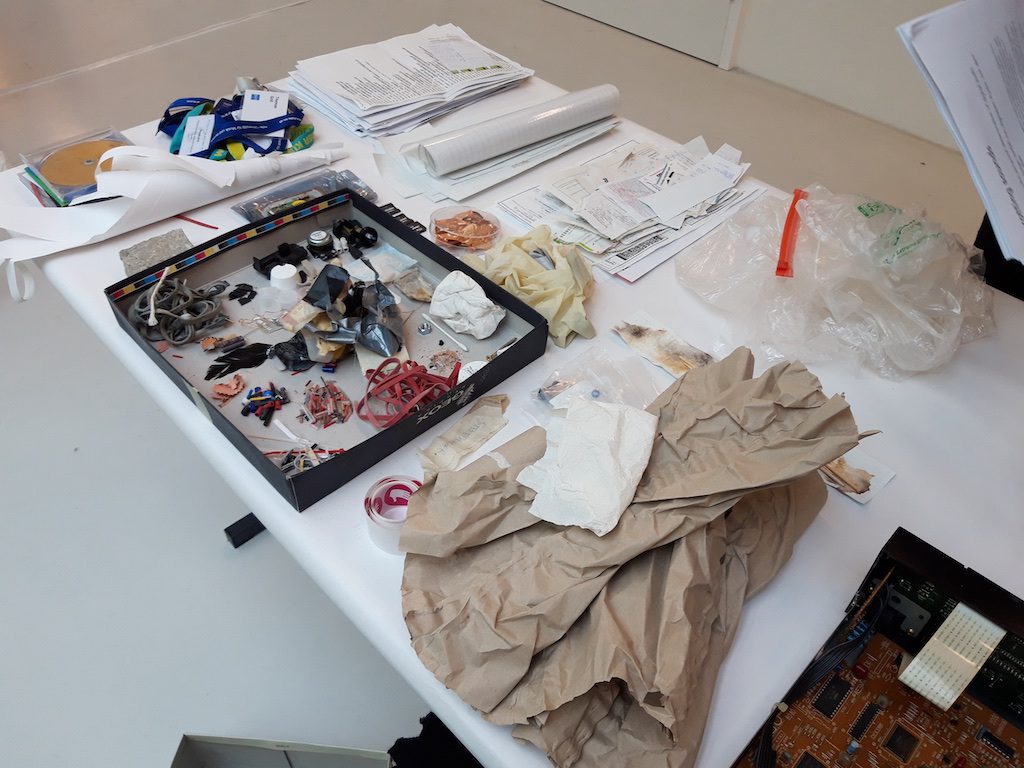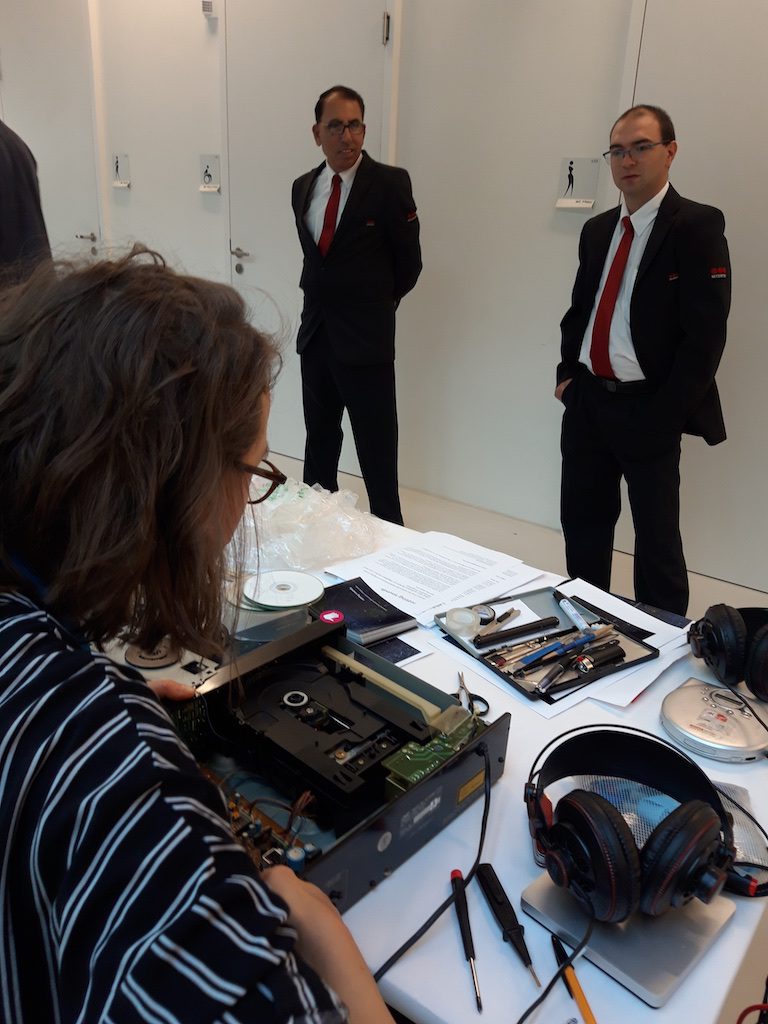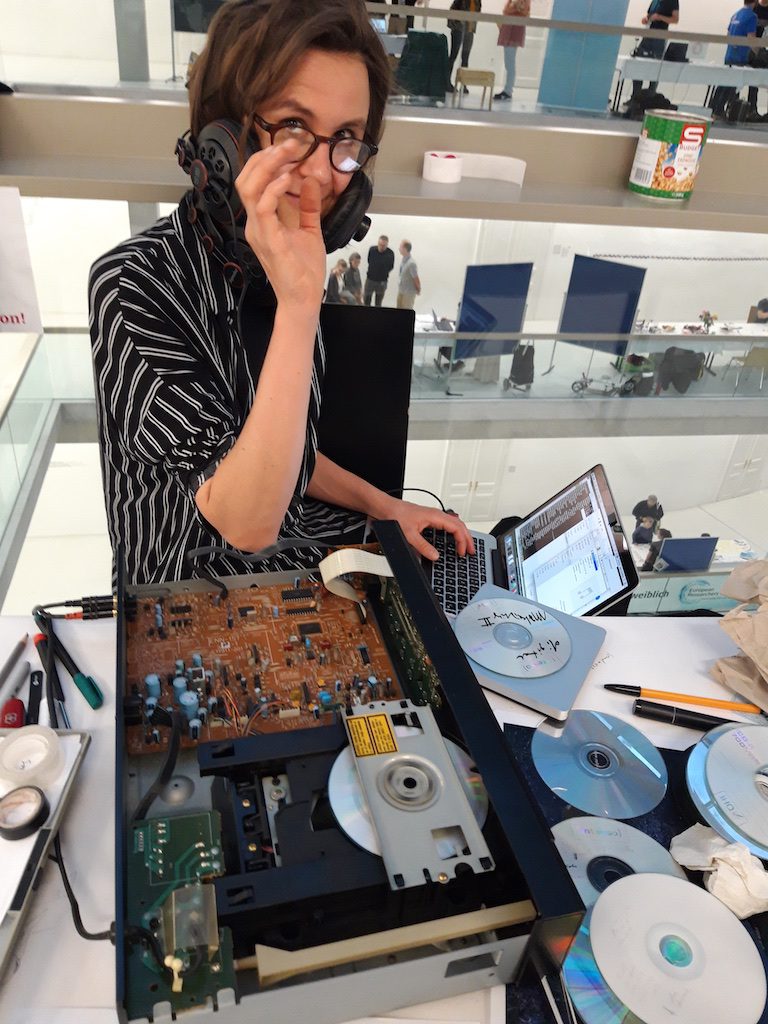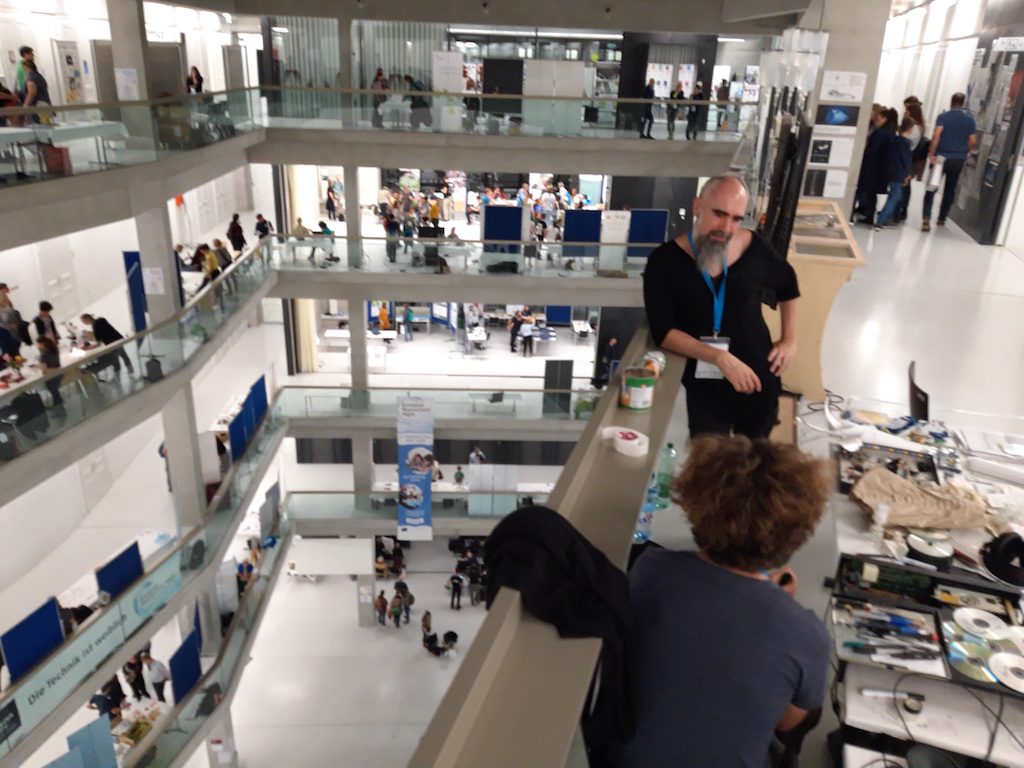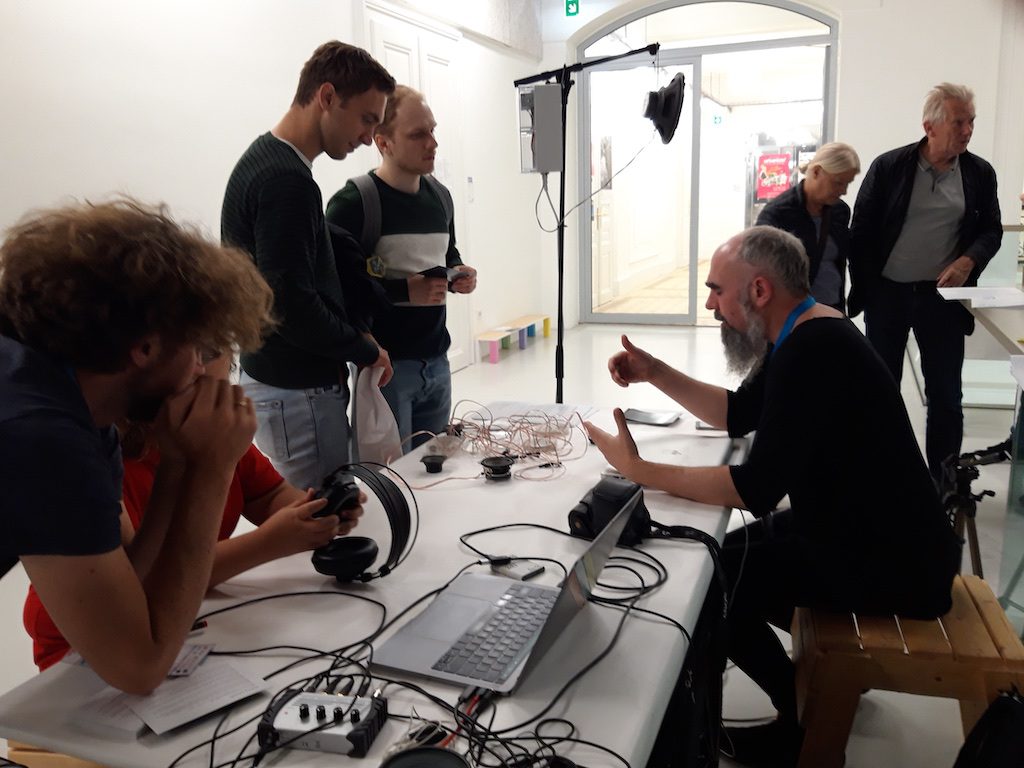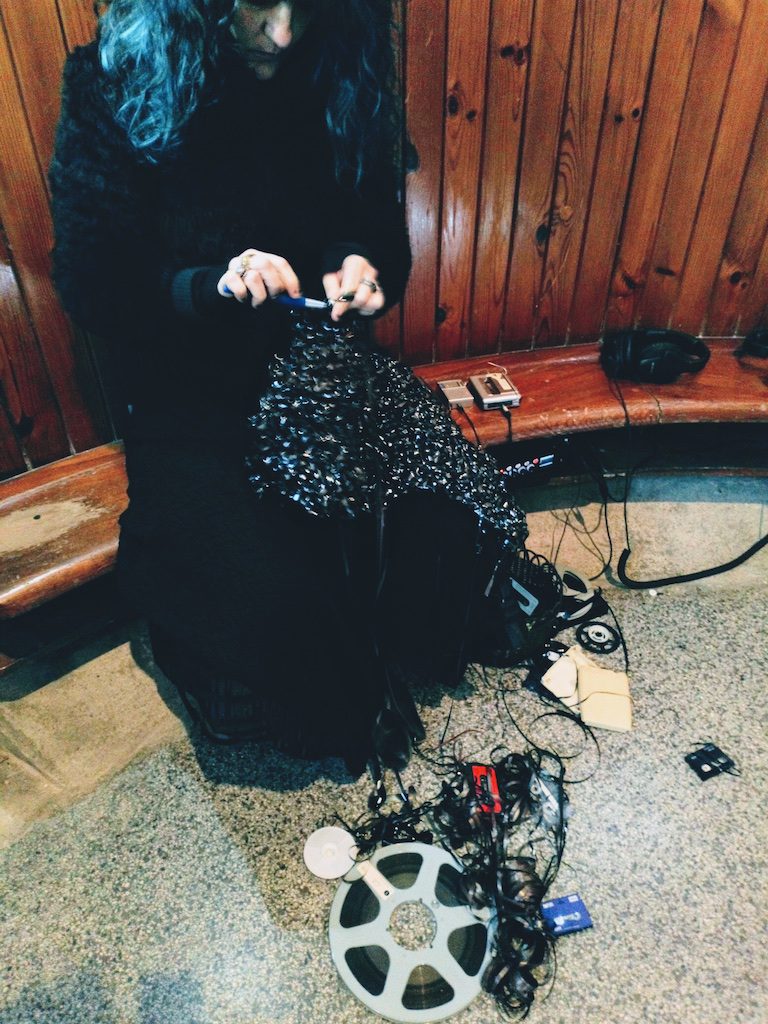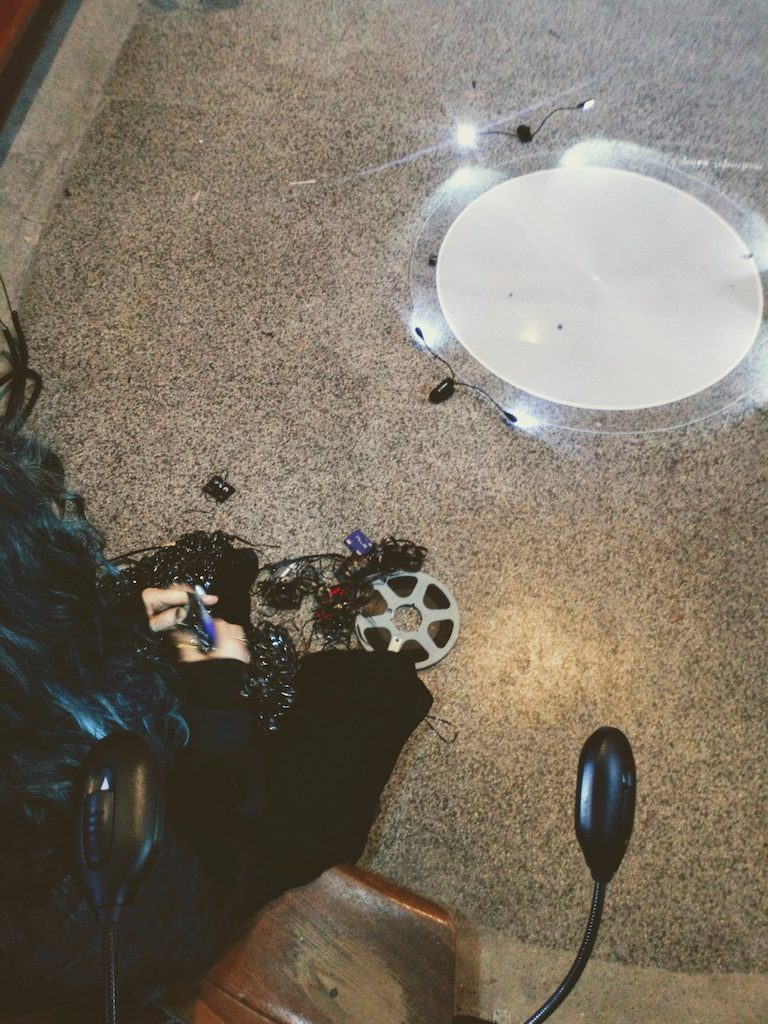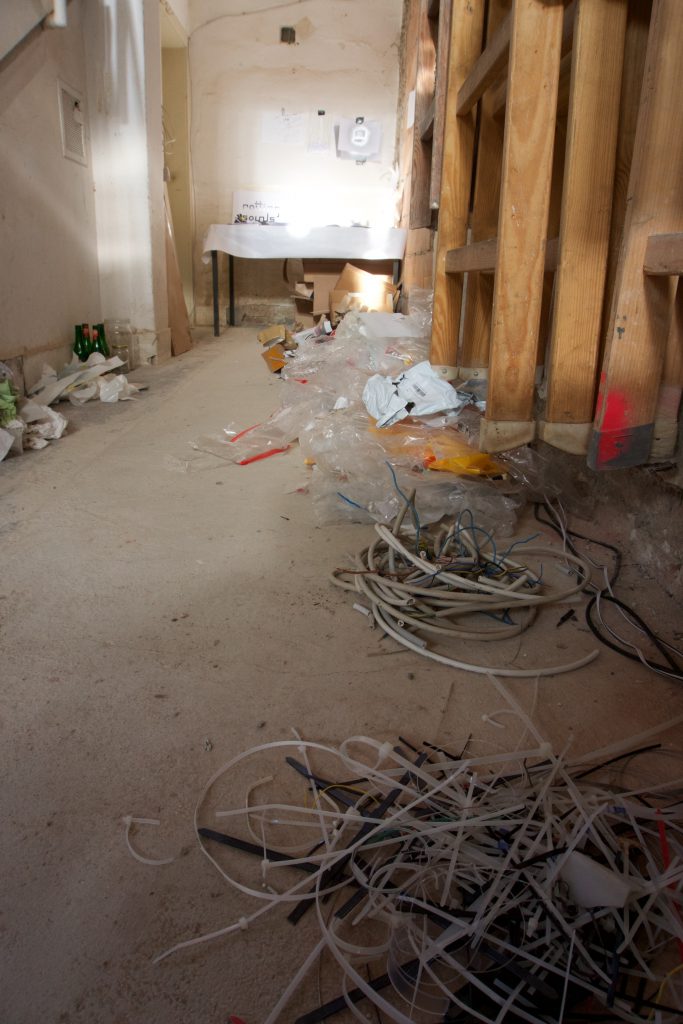Search Results for: tobias leibetseder
Rotting sounds symposium, September 23+24
Since 2018, the project of artistic research Rotting sounds – Embracing the temporal deterioration of digital audio has been researching transformation processes pertaining to the diverse interrelations of digitally encoded information in the audio domain, its material properties and (human) interpretation within a sociocultural context. This symposium provided a room for reflection on the acquired experiences in the course of the project, to bring in external viewpoints on the relevant topics and stimulate outlooks beyond the limits of current research.
Rotting sounds is a cooperation between the University of Music and Performing Arts Vienna, the University of Applied Arts Vienna and the Academy of Fine Arts Vienna and is funded by the Austria science fund (FWF project AR445).
mdw – University of Music and Performing Arts Vienna
Anton-von-Webern Platz 1
1030 Wien, Austria
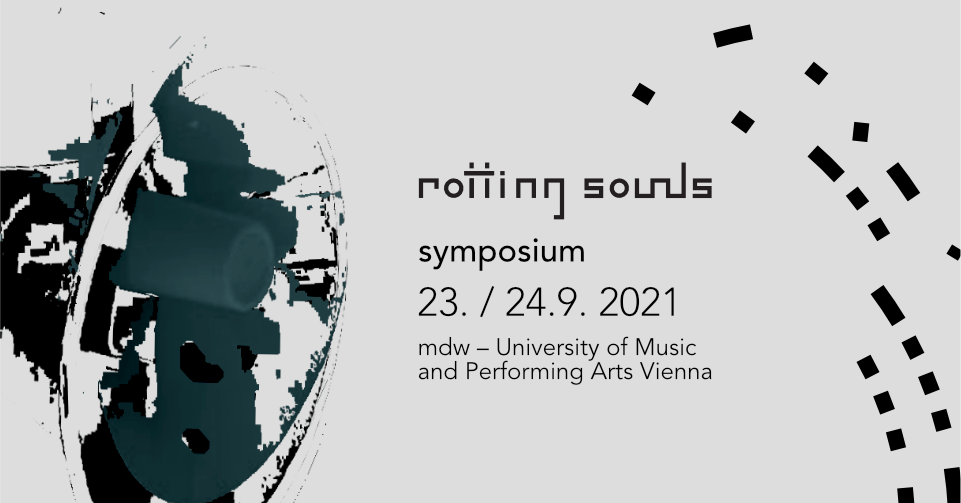
Thursday, September 23rd, 19:00-22:00
@ Klangtheater (Building V, Future Art Lab, mdw campus)
LIVE PERFORMANCES:
19:00 Till Bovermann, Dario Sanfilippo, Martin Howse, Kathrin Hunze
20:15 Castelló/Noetinger
21:00 Jasmine Guffond
Friday, September 24th, 10:00-18:00
@ Klangtheater (Building V, Future Art Lab, mdw campus)
KEYNOTES and TALKS:
10:00 Keynote by Martin Kunze
11:00 Introduction to the Rotting Sounds project by Thomas Grill, Almut Schilling and Till Bovermann
12:15 Presentation by Martin Howse
12:45 Presentation by Julian Rohrhuber (online)
13:15 — break —
14:15 Keynote by Carolin Bohlmann
15:15 Presentation by Jasmine Guffond
15:45 Presentation by Rosa Menkman (online)
16:30 Panel Discussion with Carolin Bohlmann, Angélica Castelló, Martin Howse, Martin Kunze and Almut Schilling
Friday, September 24th, 19:30-22:00
@ Klangtheater (Building V, Future Art Lab, mdw campus)
The Auditorium of Rotting Sounds can be visited through guided tours.
LIVE PERFORMANCES:
19:30 Mario de Vega
20:15 Tobias Leibetseder / Georg Zichy
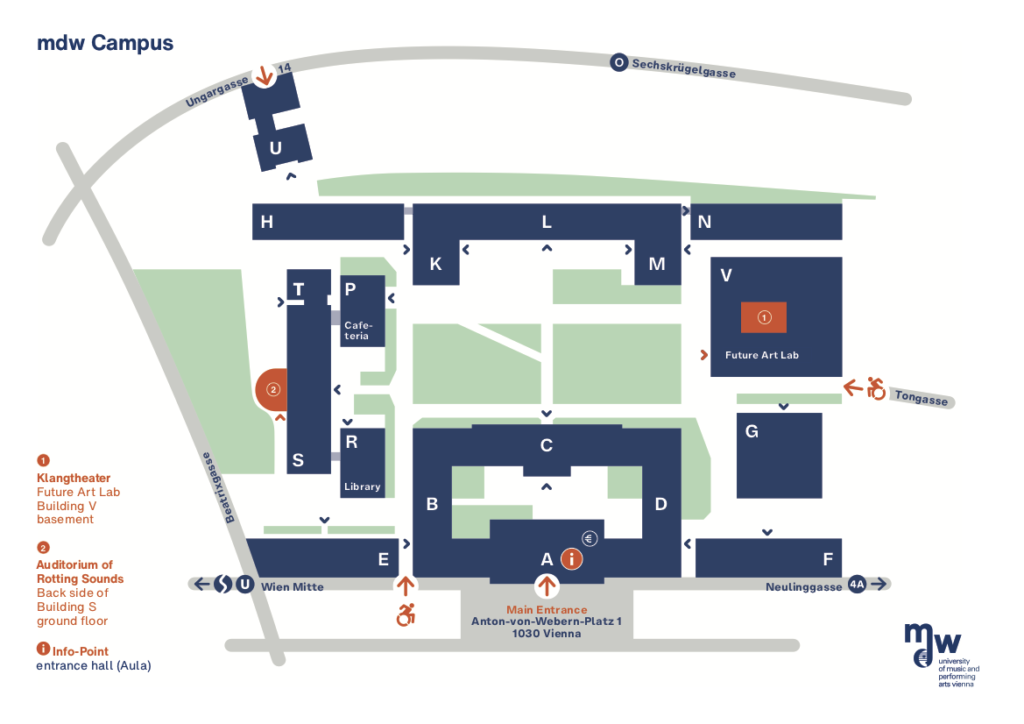
Partners:
FWF Der Wissenschaftsfonds
mdw – Universität für Musik und darstellende Kunst Wien
Universität für angewandte Kunst Wien
Akademie der bildenden Künste Wien
co-curated and produced by sound:frame

Voicings of an auralist – a series of transmissions from an unknown source
A unique artifact was found in the Auer-Welsbach-Park in Vienna that was soon discovered to be a manifestation of information left behind by who could be called an “extra-human ethnologist”.
This feature portraits the excavation and restoration processes as well as what has been extracted as the content of the discovered message, telling the story of how a sonically focused being may perceive and comment on our visually dominated world.
Till Bovermann: concept, auralist text, auralist source material
Almut Schilling: concept, forensics text, material excavation
Thomas Grill: concept, analysis
Tobias Leibetseder: concept, production, mixing
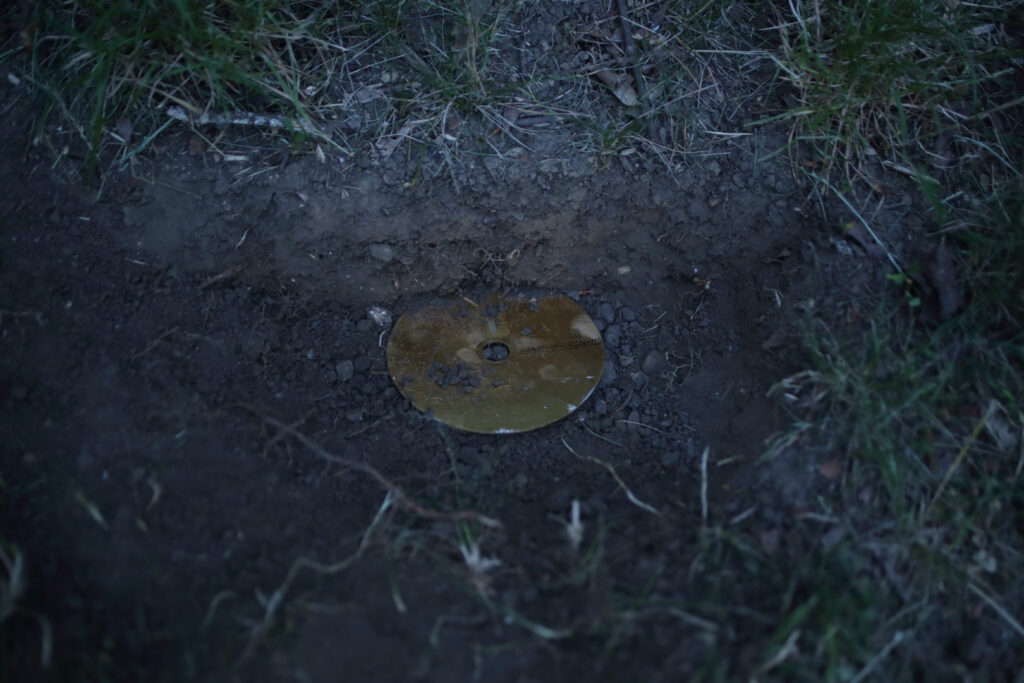
Presentations:
March 16, 16:15 CET (online) as a chapter of the new book
Knowing in Performing. Artistic Research in Music and the Performing Arts
Presentation event: https://www.mdw.ac.at/veranstaltung/?v=2616934
Registration: knowinginperforming@mdw.ac.at
Book chapter: https://doi.org/10.14361/9783839452875-008
March 21 23:00 CET, as a radio feature in ORF Ö1 Kunstradio:
Live and 7 days streaming service: https://oe1.orf.at/programm/20210321/631453/Die-Vergaenglichkeit-von-digitalem-Klang
Kunstradio (with MP3 download): http://kunstradio.at/2021A/21_03_21en.html
Please tune in, using your radio or via stream
Art’s Birthday 2020, January 17, ORF Kunstradio
Rotting sounds (Thomas Grill, Almut Schilling, Tobias Leibetseder) take part in this year’s celebration of Art’s Birthday with a CD audio production line. We will live generate digital audio on compact discs by mechanical and chemical means, and finally subject them to a testing procedure.
Art’s Birthday 2020 – 1,000,057 Years of Art
In 1963 the French Fluxus artist, Robert Filliou, declared January 17 to be the 1,000,000th birthday of art which for some decades now has been celebrated worldwide. As in the previous years, in 2020 artists all over the world will organise a networked birthday party for art.
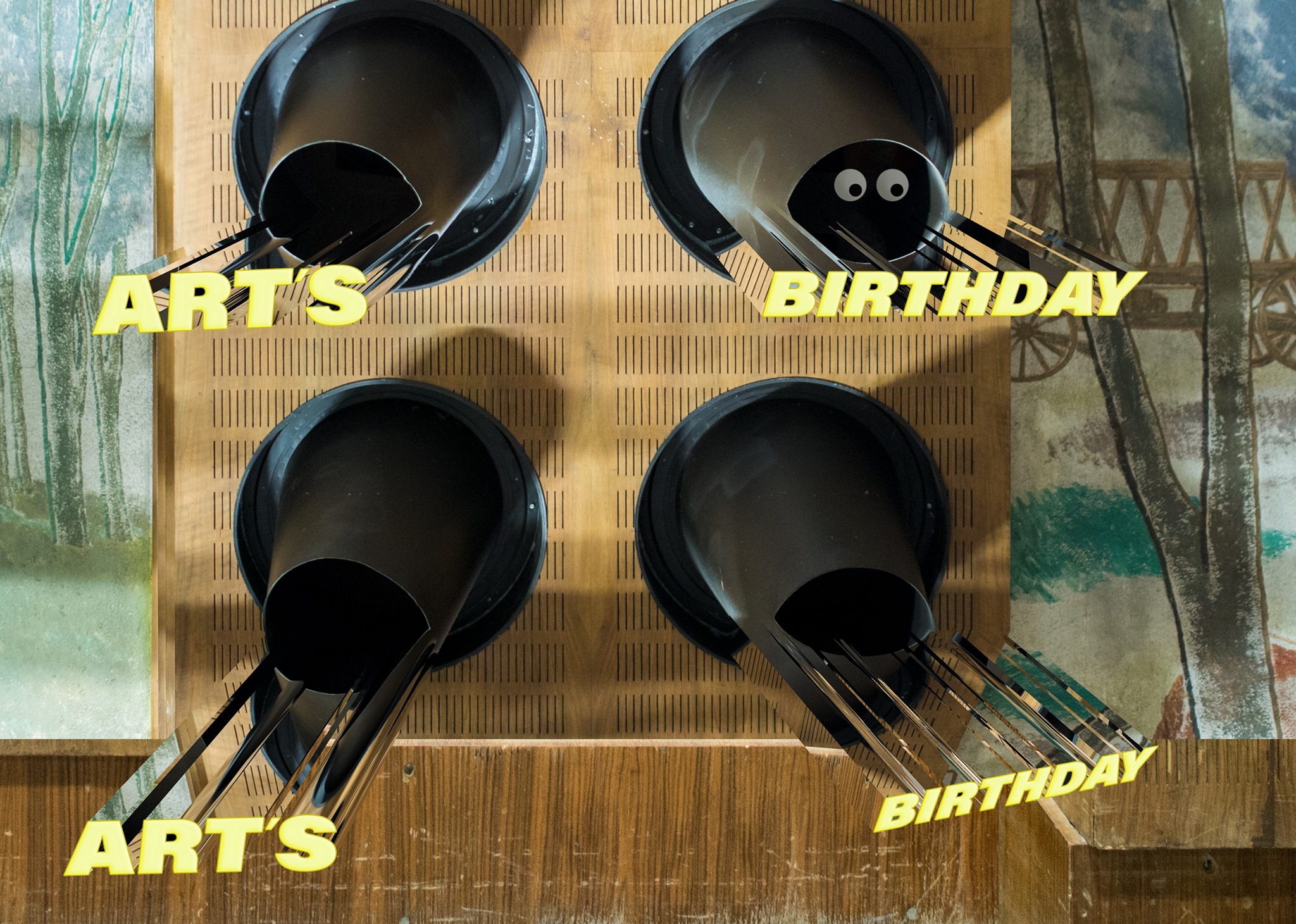
Performances and gifts by:
GOGO! von Michael Baumgartner mit Omid Darvish und Reza Tavakoli
Heavy Mental Superhereos (Runar Magnusson, Josef Trattner und Esther Vörösmarty)
Ars_Poetica (Magdalena Hahnkamper und Bernd Satzinger)
Heya Netzwerk (Nour Sokhon in Berlin, Jilliene Sellner in Wien, Yara Mekawei in Kairo und Zeynep Ayşe Hatipoğlu in Istanbul)
Instant Places (Laura Kavanaugh und Ian Birse)
Rotting Sounds
Milan Mijalkovic von Makedonien
Rdeča Raketa (Maja Osojnik und Matija Schellander) mit Patrick K.-H.
Rojin Sharafi
Susanne Schuda
Presentation: Frida Kahlo (Rosanna Ruo)
On site: 08pm – 11pm,
RadioKulturhaus Wien, Argentinierstrasse 30a, A-1040 Vienna.
On line: kunstradio.at, http://oe1.orf.at/konsole, artsbirthday.net, http://artsbirthday.ebu.ch
On air: Ö1 Radiokunst – Kunstradio live 10:08pm – 01.00am
“Fragments” performance evening
Some impressions of the “Fragments” performance evening that took place on October 2, 2019 at the Auditorium for Rotting Sounds, featuring Tobias Leibetseder, Angélica Castelló, Elisabeth Flunger and Thomas Grill.
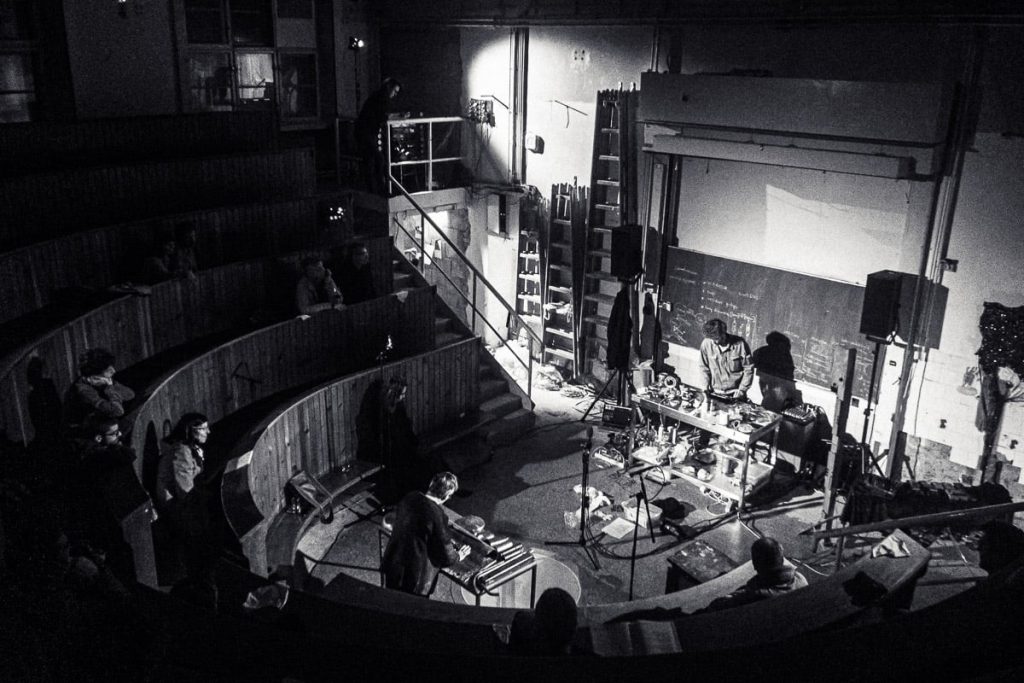
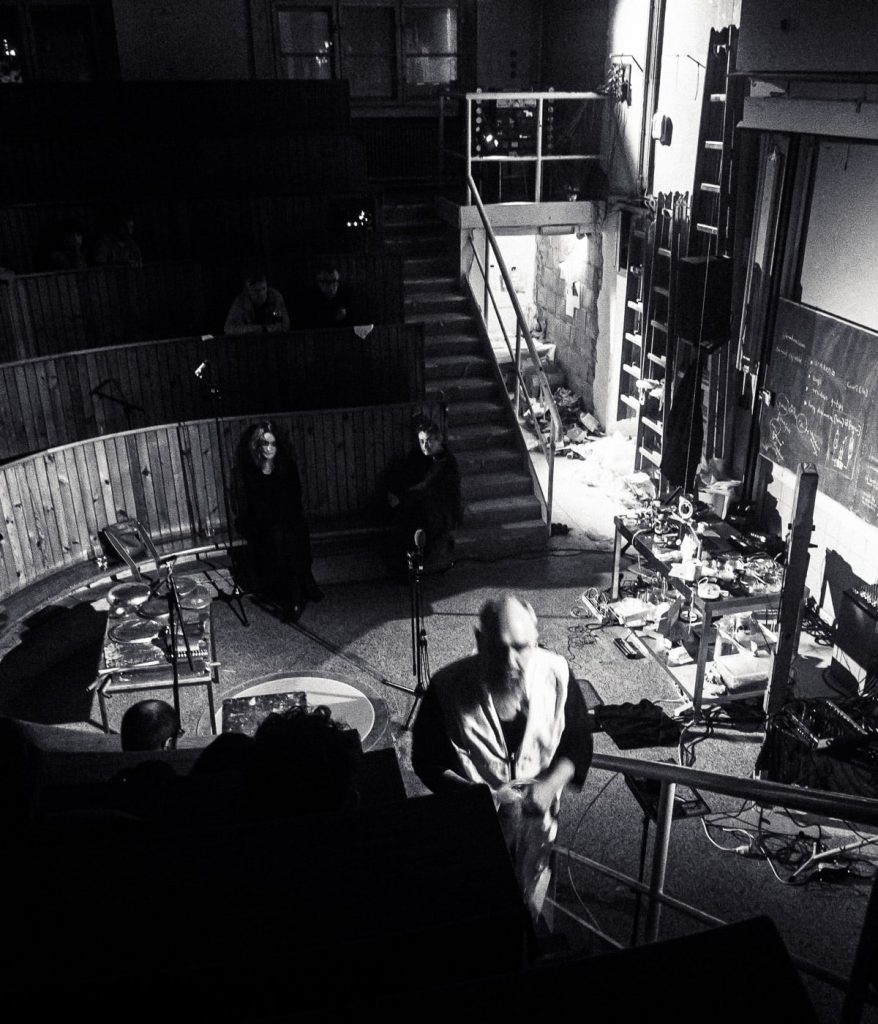
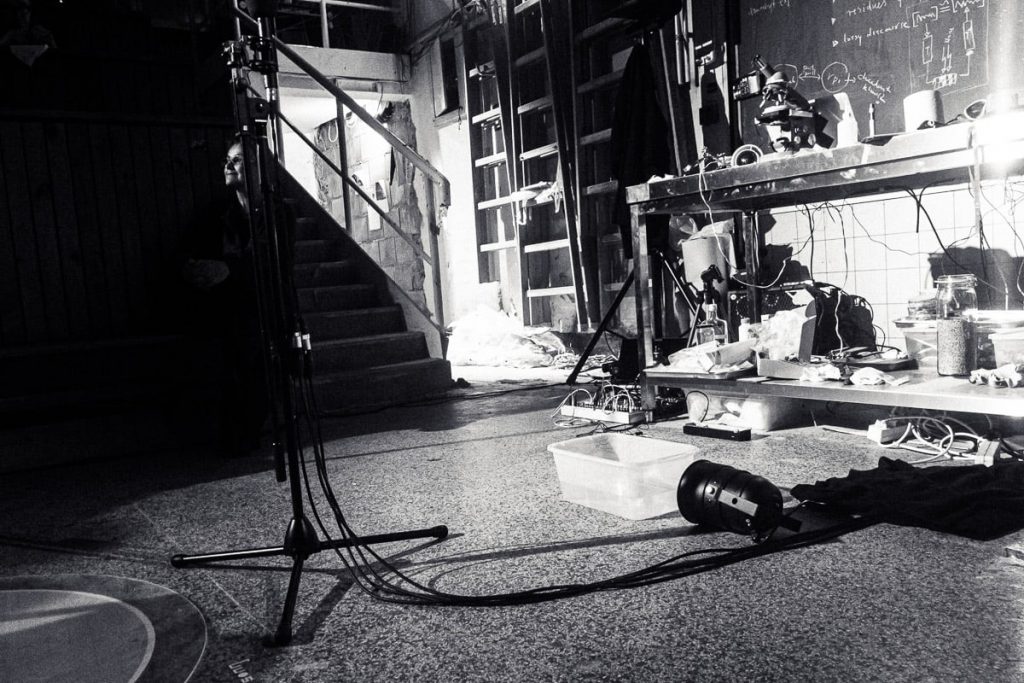
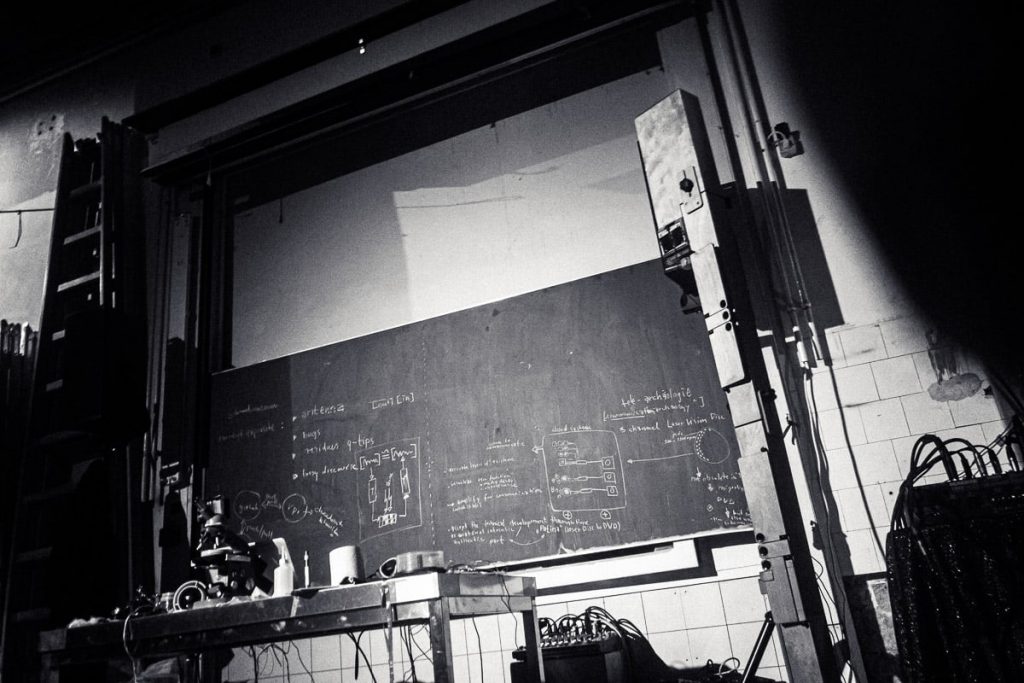
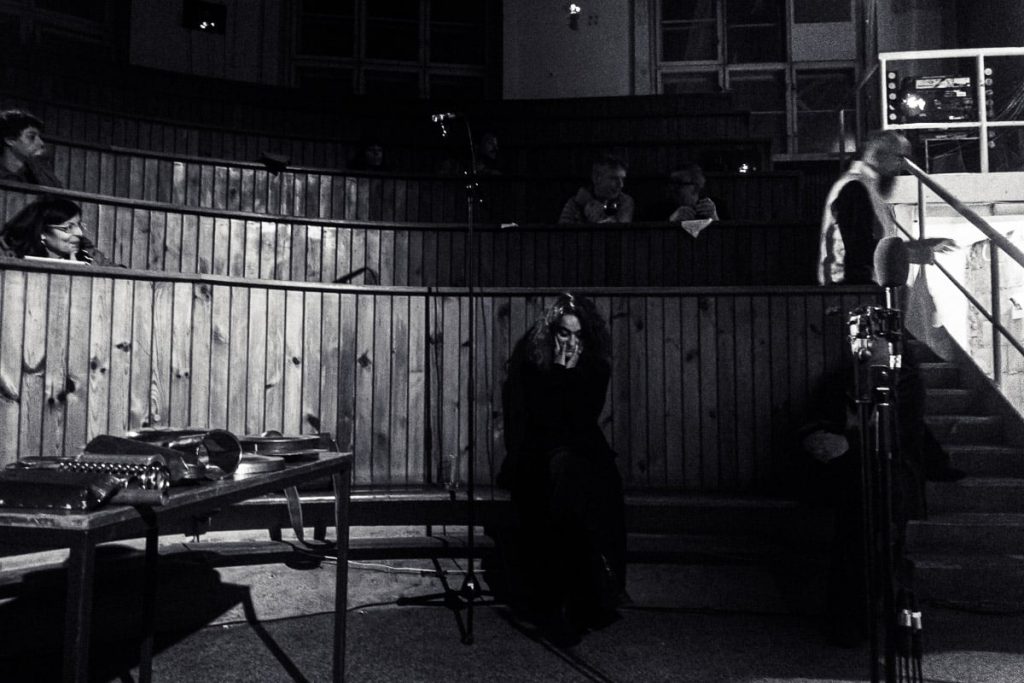
European Researchers’ Night, September 27
We took part in this year’s European Researchers’ Night, showcasing a broad range of research projects at the University of Applied Arts Vienna.
From our ongoing research, we presented a couple of exemplary positions, such as Tobias Leibetseder’s “Fragments“, Almut Schilling’s and Till Bovermann’s “CD-R(ot)“, a part of Almut’s “The Carrier” installation, Till’s take on “Data Forensics”, as well as Thomas Grill’s “Mutual understanding” and “Reference Tone“.
Performances at the Auditorium: “Fragments”, October 2
The performance evening will revolve around Tobias Leibetseder‘s processual and constantly changing sculpture “Fragments“. It is in permanent development and consists of artifacts of the Rotting sounds research process. Waste, things collected, things stored and put aside, texts, pictures, data, sounds etc. are the basis of the shape-changing work. Object or exhibition, museum or archive, collection or documentation are moments of intrinsic research and decomposition, accompanying the process and resting in the distant but immediate eye of the observer.
Tobias Leibetseder‘s performance Transformation 1 is a transformation step and insight into the process of fragments. Artifacts as materials and sounds are transformed into new shapes and synthesized in a performative and concert act.
Angélica Castelló will present a performance based on recordings of her performance “Magnetic litany” from the opening evening of the Auditorium of Rotting sounds on March 29, 2019. It is connected to the permanently exhibited object “Magnetic Room“.
Elisabeth Flunger and Thomas Grill will jointly improvise on material and digital scrap. Everything seemingly valuable today will eventually transform into scraps. We take it as an aesthetic option.
October 2, 2019 19:00
Auditorium of Rotting sounds (Altes Auditorium)
University of Music and Performing Arts Vienna
Anton-von-Webern-Platz 1, 1030 Wien
As the audience will have to be limited, admission is on personal registration only.
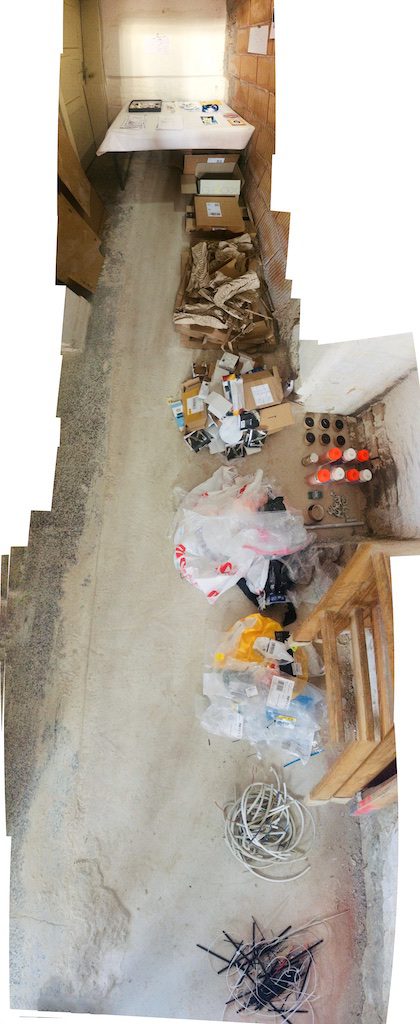
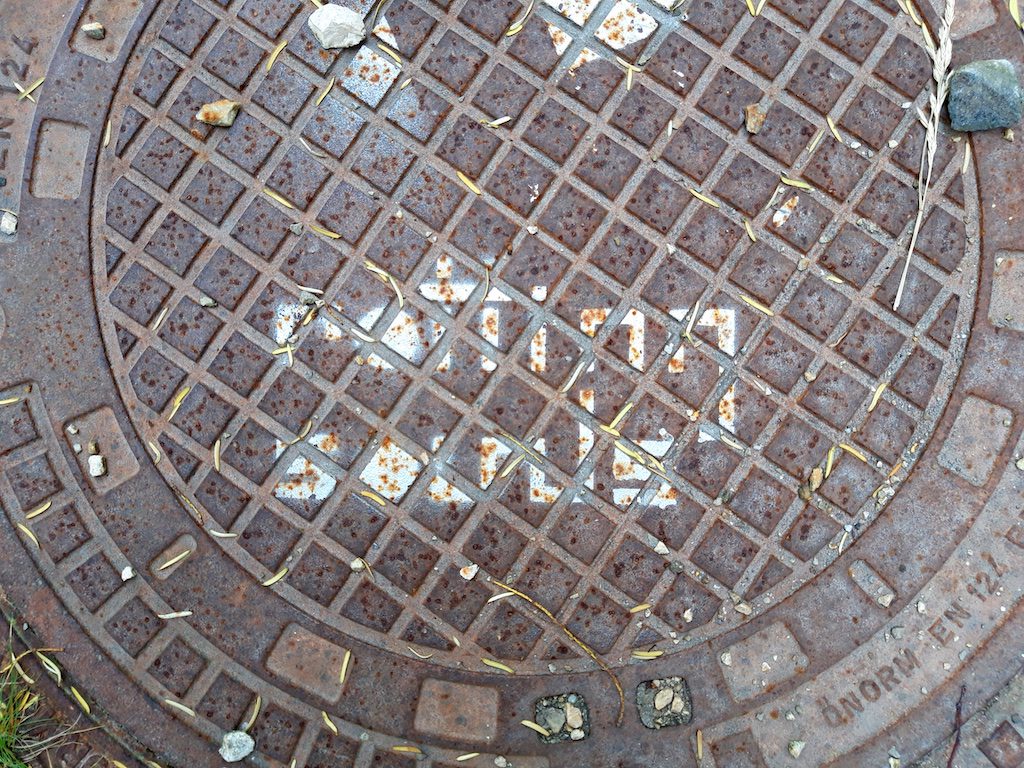
The pieces Magnetic litany 1 and 2 by Angélica Castelló have been made possible by the support of El Sistema Nacional de Creadores de Arte (FONCA).

Fragments
by Tobias Leibetseder, 2019
commissioned by rotting sounds
Cardboard, paper, plastic, metal, waste of any kind, data, sound, video
The processual and constantly changing sculpture “Fragments” is in permanent development and consists of artefacts of the Rottings Sounds process. Waste, things collected, things stored and things put aside, texts, pictures, data, sounds etc. are the basis of the shape-changing work. Object or exhibition, museum or archive, collection or documentation are moments of intrinsic research and decomposition, accompanying the process and resting in the distant but immediate eye of the virtual observer.
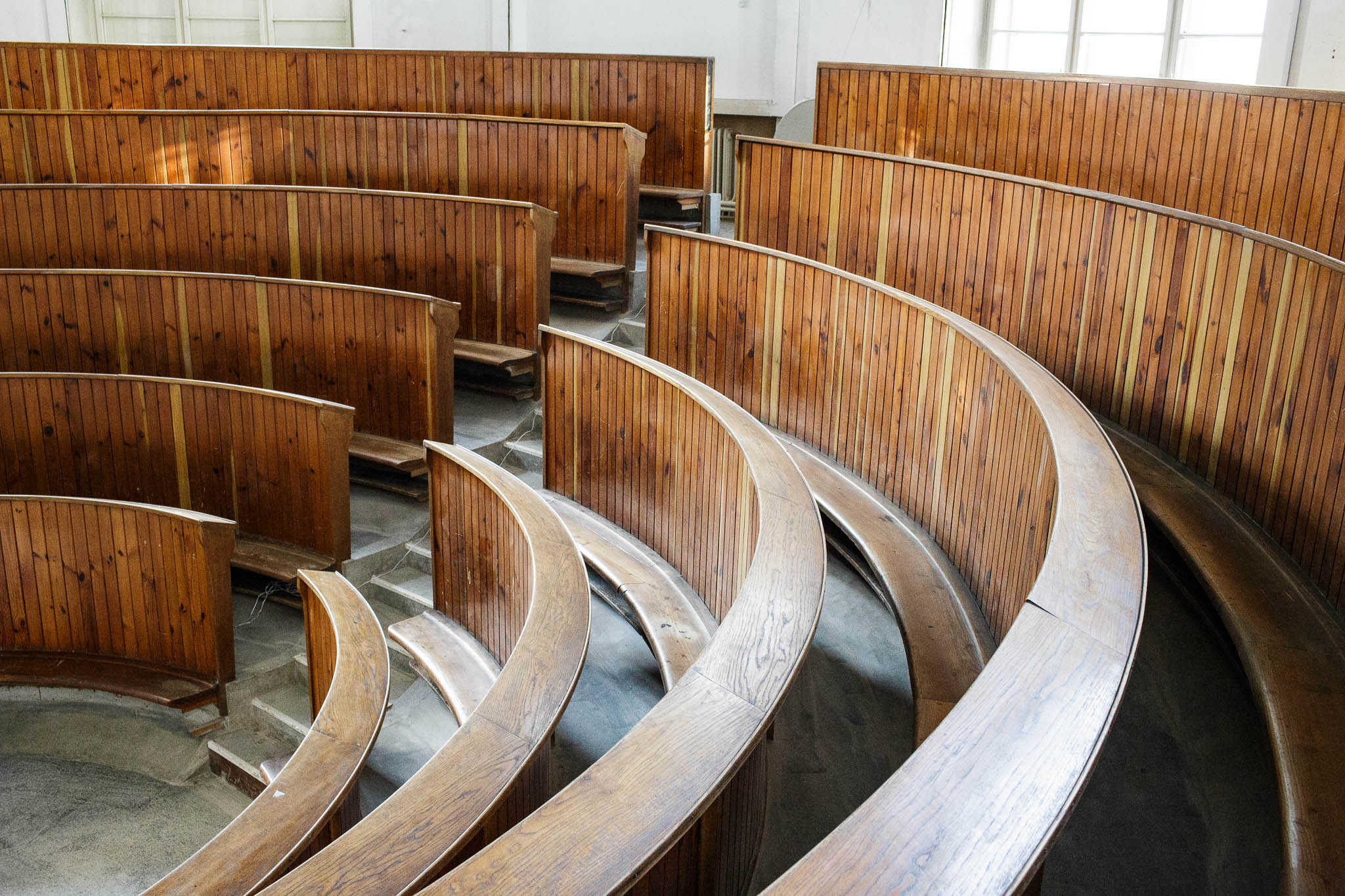
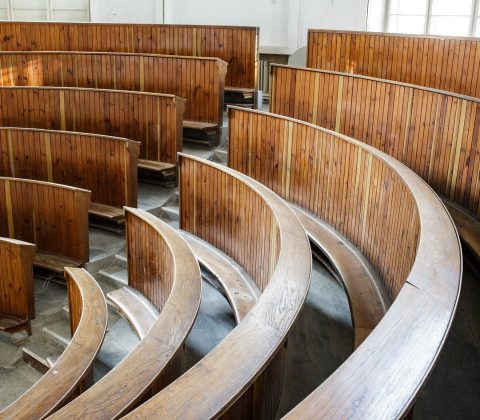
Opening of the Auditorium of rotting sounds, March 29, 6pm
Program:
Reinhold Friedl: Die Suche nach dem Original: vom Verfall elektroakustischer Musik – lecture
Klaus Filip: Sonic Dust – opto-acoustic performance
Till Bovermann: Buffer manipulations – live coding performance
Mario de Vega: Suspension – for quadraphonic system, tape, objects and self-made electronics
at the Bankettsaal of the University of Music and Performing Arts Vienna
Anton-von-Webern-Platz 1, 1030 Wien, Austria
The Auditorium is open after 7pm with the following works on display:
Angélica Castelló: Magnetic Room – objects and sound installation
Klaus Filip: Dust a bit – opto-acoustic installation
Juliana Herrero and Thomas Grill: Antenna – sounding object
Martin Howse: Enrichment and depletion – installation
Nicole Krenn and Thomas Grill: Fields of Haze – audiovisual installation
Tobias Leibetseder: Fragments – installation
Mario de Vega: Intermission – sounding object
Till Bovermann and Almut Schilling: CD-R(ot) – sound installation
… and other works and experimental setups of the project team Thomas Grill, Till Bovermann and Almut Schilling.
Live events in the Auditorium during the opening:
Angélica Castelló: Magnetic litany – Performance
Charlotta Ruth: Intervention
Dario Sanfilippo: Phase transitions – Multi-channel electroacoustic performance
For a visit of the auditorium at the opening a personal registration is absolutely recommended!
Workshop with Martin Howse and Till Bovermann on circulation/corruption:
28.3., 10:00 to 17:30 and 29.3., 09:30 to 13:00
at the Senatssitzungsraum (AW L0123) and the whole campus.
The rotting sounds project is a cooperation between the University of Music and Performing Arts Vienna, the University of Applied Arts Vienna and the Academy of Fine Arts Vienna, funded by the Austrian Science Fund (FWF).
Auditorium of rotting sounds
Our research project is physically located at the main campus of the University of Music and Performing Arts Vienna, in the only unrestored building which used to be an auditorium of the former School for Veterinary Medicine.
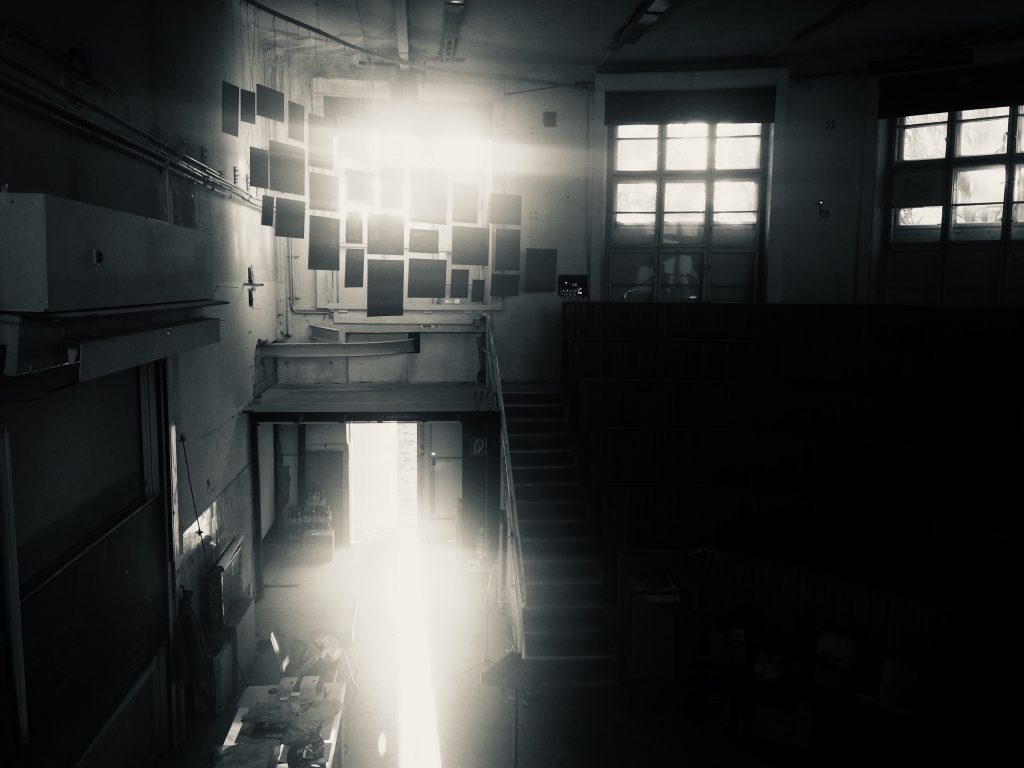
Address: Altes Auditorium, Anton von Webern Platz 1, 1030 Wien.
The building is the northern half-round element on the back side of building S on the campus.
We run our own project-related experiments with sound and media in this room, but it is also a publicly accessible listening space. We integrate external artistic positions which are related to our research agenda, that is, working with digital sound and time-dependency.
Conceptually, we refer to the legendary Mold museum (Schimmelmuseum) by artist Dieter Roth. Roth is well-known for his works with (bio-)degradable art and established his Schimmelmuseum in 1992 both as a workplace and a museum for the produced works.
Currently, the following works are on display:
- Juliana Herrero and Thomas Grill: Antenna – sound installation
- Almut Schilling: The Carrier – experimental system
- Till Bovermann and Almut Schilling: CD-R(ot) – sound installation
- Klaus Filip: Dust a bit – opto-acoustic installation
- Martin Howse: Enrichment and depletion – installation
- Nicole Krenn and Thomas Grill: Fields of Haze – audiovisual installation
- Hannes Köcher and Thomas Grill: Inscriptions from the Archive – processual installation
- Mario de Vega: Intermission – sounding object
- Tobias Leibetseder: Fragments – installation
- Angélica Castelló: Magnetic Room – objects and sound installation
- Thomas Grill: Midnight song – sound object
- Dario Sanfilippo: Phase transitions – sound installation
Currently exhibited at ESC Medienkunstlabor in Graz, Austria:
- Thomas Grill: Mutual understanding – sound installation
Details about the space, the works and the artists can be found in our exhibition catalog.
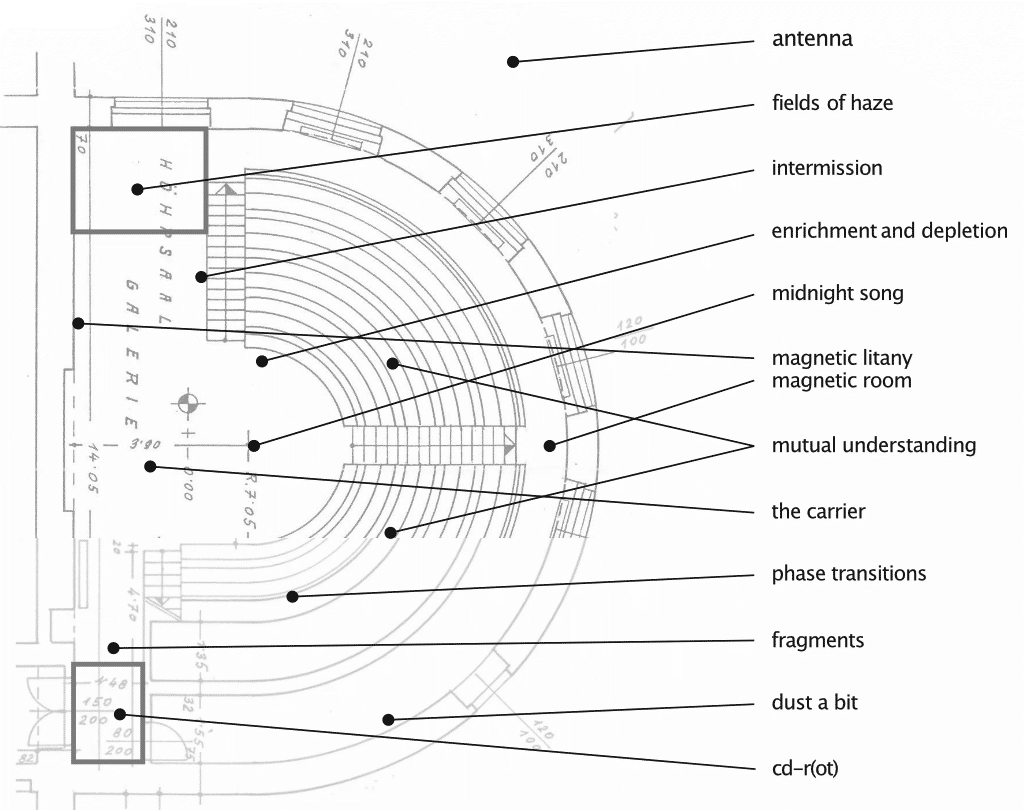
Due to the COVID-19 restrictions, the Auditorium can currently one be visited upon individual appointment.
Events
- 3.-9. July 2022: Adam McCartney’s and Thomas Grill’s joint composition “rill” will be presented as a piece+paper at the ICMC 2022 conference in Limerick, Ireland
- 14. March 2022: Online presentation of the Research catalogue exposition Fragments in time for the VIS #7 issue by Tobias Leibetseder and Thomas Grill.
- 8. March 2022: Short feature of Rotting sounds in the ORF Ö1 Radiokolleg series
- 11. January 2022: Lecture performance by Thomas Grill at Sweet Spot series, University Mozarteum and Paris Lodron University, Salzburg, Austria.
- 12. November 2021: Adam McCartney’s and Thomas Grill’s joint composition “rill”, part of the festival Wien Modern.
- 11. November 2021: Lecture by Almut Schilling at the Research Day 2021 at the Academy of Fine Arts, Vienna.
- 2. November 2021: Online talk by Thomas Grill at KTH Royal Institute of Technology, Stockhelm, Sweden.
- 8. October 2021: Opening of exhibition “oberhalb/unterhalb” at Stadtgalerie Waidhofen, featuring a fragment of fields of haze.
- 23.+24. September 2021: Rotting Sounds symposium at mdw – University of Music and Performing Arts Vienna.
- 1. May 2021: Opening of exhibition “Rieseln” in National Park Gesäuse‘s visitor’s center in Gstatterboden.
- 24. April 2021: Exhibition “Rieseln” at Nationalparkradio, Radio Freequenns, das Freie Radio im Ennstal.
- 9. April 2021: Presentation of Almut Schilling, Thomas Grill, Till Bovermann: Digital Patina at the SAR2021 artistic research conference.
- 21. March 2021: Voicings of an auralist at ORF Ö1 Kunstradio
- 16. March 2021: Book presentation Knowing in Performing with book chapter Voicings of an auralist
- 18. February 2021: Opening of “Mutual Understanding” at ESC Medienkunstlabor Graz, Austria.
- 17. January 2021: Thomas Grill featuring the installation mutual understanding at Art’s Birthday at Radio Helsinki.
- 1.-2. December 2020: International Faust Conference 2020 with Till Bovermann and Dario Sanfilippo at the Maison des Sciences de l’Homme Paris Nord.
- 26. October 2020: Performance of Low Frequency Orchestra (including Thomas Grill), Jerôme Noetinger and Wolfgang Mitterer @ Reaktor, Wien
- 9. October 2020: Panel discussion with Thomas Grill @ musikprotokoll, Graz.
- 8. October 2020: Performance “noise shaping” by Thomas Grill @ musikprotokoll, Graz.
- 11. September 2020: Performance “merge and dissolve” by Thomas Grill, Till Bovermann and Kathrin Hunze @ SOUND CAMPUS, ars electronica festival, Linz
- 21.-28. August 2020: Residency of Thomas Grill in National Park Gesäuse preparing next year’s exhibition at the visitor’s center in Gstatterboden.
- 20. May 2020: Performance evening at the Auditorium of Rotting Sounds: concert lecture by Stefan Fraunberger – postponed due to the COVID-19 crisis.
- 24. April 2020: Performance evening at the Auditorium of Rotting Sounds: duo Jérôme Noetinger / Thomas Grill – cancelled due to the COVID-19 crisis.
- 19. March 2020: Lecture by Thomas Grill at SAMA, University of the Arts, Helsinki, Finland. – cancelled due to the Corona virus outbreak.
- 17.-20. March 2020: Workshop by Thomas Grill at Aalto University, Department of Media, Helsinki, Finland. – cancelled due to the Corona virus outbreak.
- 6.-7. March 2020: Talk by Almut Schilling at the conference of the Austrian Restoration Association, Salzburg, Austria
- 26. February 2020: Poster presentation at the Klausur der Wissenschaften / MDW.
- 13. February 2020: Performance at Do Trans-Art, Salzburg, Austria.
- 17. January 2020: Rotting sounds @ Art’s Birthday, ORF Radiokulturhaus, Vienna, Austria
- 16. January 2020: Artistic Research Conference “Navigieren im Postdigitalen”. Soundframe @ AIL, Vienna, Austria
- 12. December 2019: Visit of the German Council of Science and Humanities (Wissenschaftsrat) at the Auditorium of Rotting Sounds.
- 4.+5. December 2019: Musical Materialities Panel, Masterclass and Performance at the University of Sussex, Brighton, UK.
- 16.+17. November 2019: Open Studio Days 2019 of the VIENNA ART WEEK. Auditorium open 15-18h.
- 2. October 2019: Performance evening “Fragments” at the Auditorium of Rotting Sounds
- 27. September 2019: Presentation at the European Researcher’s Night, University of Applied Arts Vienna.
- 7. September 2019: Installation “Mutual understanding” at the AI x Music festival, part of the Ars Electronica festival 2019.
- 27. June 2019: Opening of the UNDERSTANDING – ART & RESEARCH exhibition with our participation at the Museum of Applied Arts Vienna.
- 13. June 2019: Musical performance of Thomas Grill and Angélica Castelló at the Cassette Culture Node.Linz exhibition.
- 21.-25. May 2019: Talks, concerts and workshop at the New stage media lab and Herzen University, St.Petersburg, Russia
- 16.-17. May 2019: Mini-symposium on Heretical Sound Synthesis, University of the Arts Helsinki, Sibelius Academy, Helsinki, Finland
- 29. March 2019: Grand opening of the Auditorium of Rotting Sounds, University of Music and Performing Arts, Vienna, Austria.
- 28./29. March 2019: Workshop with Martin Howse and Till Bovermann at the University of Music and Performing Arts, Vienna, Austria.
- 22.–23. March 2019: Participation at the 10th SAR International Conference on Artistic Research at ZHdK, Zürich, Switzerland.
- 13. March 2019: Participation in panel discussion “Ungehörtes – Unerhörtes”, Library of the University of Music and Performing Arts Vienna, Austria.
- 8. December 2018: Participation in the Event Instruments Make Play at WORM, Rotterdam, NL.
- 26.–30. November 2018: Participation in the Orpheus Research Summit in Ghent, Belgium.
- 28./29. November 2018: Talk and artistic intervention at the Forum Media Technology, University of Applied Science in St.Pölten, Austria.
- 8.+9. November 2018: Workshop “sound-material-time”, Anton Bruckner Private University, Linz, Austria.
- 31. October 2018: Performance of the electroacoustic composition residuals at re_composed, part of paraflows XIII, festival for digital art and cultures, Vienna, Austria.
- 8. September 2018: Talk and panel discussion at the symposium “.. under control of Music | Music under control of .. composing (in) digital worlds”, Ars Electronica festival, Anton Bruckner University in Linz, Austria.
- 1.–28. September 2018: Invisible Worlds Residency …and then we will see if we can be friends at Eden Project, Cornwall, UK.
- 14. August 2018: Talk at the isaScience conference in Reichenau/Rax, Austria.
- 8. August 2018: Performance at Silence London, London, UK.
- 16. May 2018: Talk at the Politics of the Machine conference in Copenhagen, Denmark.
- 11. May 2018: Kick-off open session at the University of Music and Performing Arts Vienna, Austria.
- 4. May 2018: Impulse talk at the panel “Artistic research as a bridge between the disciplines”, University of Music and Performing Arts Vienna, Austria.
- 2. May 2018: Talk and discussion at the Angewandte Innovation Lab, Vienna, Austria.
- 4. April 2018: Talk at the Artistic Research symposium, University of Music and Performing Arts Vienna, Austria.
- 27. February 2018: Poster presentation at the science conclave, University of Music and Performing Arts Vienna, Austria.
